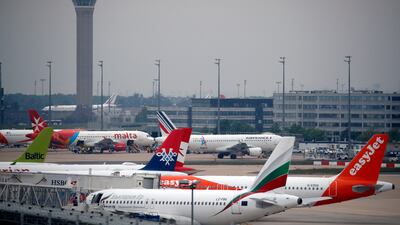An EU plan to increase the share of sustainable aviation fuel available at airports gives “planning certainty” to oil companies, according to a Boeing executive.
Last week, the EU reached an agreement to set binding targets for European airlines to increase their use of clean fuels.
By 2025, suppliers are required to guarantee that 2 per cent of the fuel they offer at EU airports consists of clean fuels. This requirement will increase to 6 per cent in 2030, 20 per cent in 2035, and rise to 70 per cent by 2050.
“The oil companies now have a demand signal that's coming out of Europe, but there really needs to be a convergence of incentives and mandates to scale this, because it's a market in the end,” Brian Moran, vice president at global sustainability policy and partnerships at Boeing, said on Tuesday during a panel discussion at the Arabian Travel Market.
“Oil companies have to decide where to invest [and] where to make money. They have choices.”
The EU target gives airlines a “horizon to shoot for”, Mr Moran said.
Sustainable aviation fuel, which is made from resources such as agricultural waste, green hydrogen and cooking oil, is widely considered as the most significant contributor to helping the sector reach its net-zero emissions target by 2050.
But achieving this would require a major increase in clean fuel production from current levels, and lower costs.
The US, the world’s largest domestic airline market, has a road map to increased sustainable fuel production.
The government aims to collaborate with the aviation industry to produce 3 billion gallons of sustainable fuel every year by the end of the decade. It also plans to have enough to meet 100 per cent of aviation fuel demand by 2050.
The US Inflation Reduction Act, which was enacted last year, provides producers with a tax credit of $1.25 per gallon.
“The green premium between sustainable aviation fuel and jet A [fuel] will start closing because of these incentives stacking,” said Mr Moran.
“This won't be a forever subsidy. This will be sufficient to get supplies scaled, so that the price comes down and then we'll just …[have] normal market forces.”
The US plane builder plans to make further purchases of the clean fuel to cut carbon from its own operations, he said.
In February, Boeing signed agreements to purchase 5.6 million gallons of sustainable fuel produced by Neste to support its US commercial operations through 2023. The deal more than doubled the company's sustainable fuel procurement from last year.
“We're going to continue to purchase sustainable fuels for our own operations in our supply chain because that's the commitment we have made as a company to decarbonise ourselves,” said Mr Moran.
In 2021, the world's airlines pledged net-zero carbon emissions from their operations by 2050 — bringing the air transport industry in line with the objectives of the 2015 Paris Agreement to limit global warming to 1.5°C above pre-industrial levels.
Aviation industry players are facing pressure from environmental groups to lower their carbon footprint and make operations greener after the coronavirus pandemic.








